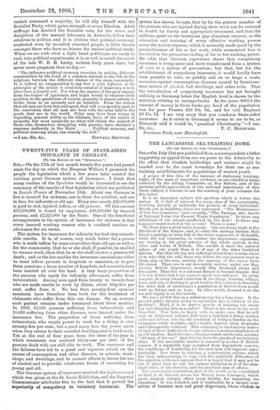TWENTY-FIVE YEARS OF STATE-AIDED INSURANCE IN GERMANY.
[To THE EDITOR OF THE " SPECTATOR."] SAS,,—On the 17th of last month twenty-five years had passed since the day on which the Emperor William L promised his . people the legislation which a few years later created the existing great German system of insurance. I think that many readers of the Spectator would be interested to see the summary of the results of that legislation which was published in Soziale Praxis of November 15th. About one German in five is insured for sickness, one in three for accident, and one in four for infirmity or old age. Every year nearly £25,000,000 is paid to sick, injured, infirm, or old persons. Of this amount £12,500,000 is found by employers, £10,250,000 by insured persons, and £2,225,000 by the State. One of the beneficent arrangements in the system of insurance for sickness is that every insured working woman who is confined receives an allowance for six weeks.
The system for insurance for infirmity has had very remark- able results. It is, of course, very much better for a person who is made infirm by some cause other than old age, as well as for the community, that he or she shall, if possible, be enabled to resume work, than that he or she shall receive a pension till death ; and as the law enables the insurance associations either to treat infirm persons in hospitals or sanatoria, or to give them pensions, a large number of hospitals and sanatoria have been erected all over the land. A very large proportion of the persons who apply for infirmity allowances suffer from tuberculosis. Among men aged from twenty to twenty-four 'who are made unable to work by. illness, about fifty-five per cent. suffer from it. No less than seventy-four open-air sanatoria. have therefore been built for the treatment of claimants who suffer from this one disease. On an average each patient remains under treatment about three months. In 1902, 16,518 persons suffering from tuberculosis, and 19,433 suffering from other diseases, were treated under the insurance law. The proportion of those suffering from tuberculosis who regain power to work for a living is over seventy-five per cent., but a good many lose the power again when they return to their crowded dwellings and to hard work. Yet at the end of four years from the close of the year in which treatment was received thirty-one per cent. of the persons dealt with are still able to work. The successes and the failures have led to a great and vigorous attack on the causes of consumption and other diseases, in schools, work- shops, and dwellings, and to earnest efforts to lessen the use 'of alcohol and to provide wholesome forms of recreation for young and old, The German system of insurance received the highest award which was given at the St. Louis Exhibition, and the Imperial Commissioner attributes this to the fact that it proved the superiority of compulsory to voluntary treatment. The
system has shown, he says, that by far the greater number of the persons who are injured during their work can be restored to health by timely and appropriate treatment, and that, the millions spent on the treatment pay abundant interest, as the education and training of every effective working person cause the nation expense, which is normally made good by the productiveness of his or her work, while economical loss is involved in the premature ending of his or her working power. He adds that German experience shows that compulsory insurance is being more and more transformed from a system of cure to a system of prevention ; but that, but for the establishment of compulsory insurance, it would hardly have been possible to take, so quickly and on so large a scale, measures against consumption, diseases caused by licentious- ness, misuse of alcohol, bad dwellings, and other evils. That the introduction of compulsory insurance has not brought self-help in Germany below the English level is shown by the statistics relating to savings-banks. In the years 1903-4 the amount of money in those banks per head of the population; was for poor Prussia £10 10s. 6&, and for rich England £4 15s. 7d. I am very sorry that you condemn State-aided insurance. As it exists in Germany it seems to me to be, as Bismarck said it would be, " practical Christianity."—I am, Sir, &c., T. C. HossrALL. Swanscoe Park, near Macclesfield.






































 Previous page
Previous page